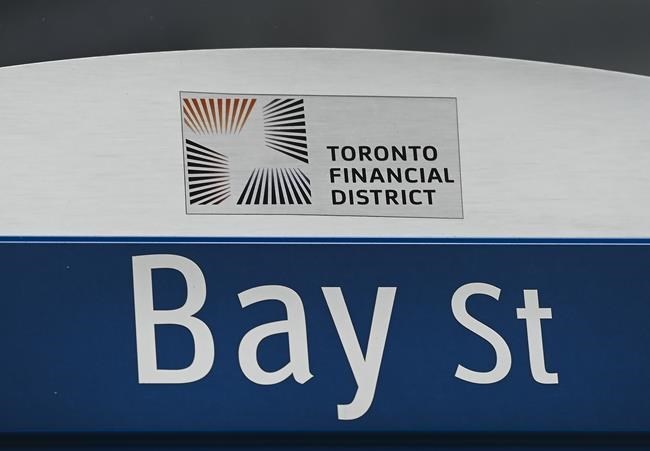TORONTO — Canada's main stock index rose almost 150 points Tuesday amid broad-based gains after a new report showed inflation slowed in May, while U.S. markets also rose on economic optimism.
The S&P/TSX composite index was up 145.77 points at 19,733.09.
In New York, the Dow Jones industrial average was up 212.03 points at 33,926.74. The S&P 500 index was up 49.59 points at 4,378.41, while the Nasdaq composite was up 219.89 points at 13,555.67.
Tuesday saw a continuation of an ongoing trend, where tech stocks — particularly large companies involved in artificial intelligence — are outpacing the broader market, said Lesley Marks, chief investment officer of equity at Mackenzie Investments.
In recent weeks, “we’ve seen a little bit of broadening out, but that’s not today’s story,” she said. “It’s narrow once again.”
Nvidia, one of the tech stocks that’s helped lead the rally, was up 3.1 per cent Tuesday, while Tesla gained 3.8 per cent.
However, markets were also up more generally with some economic optimism off the backs of some positive data, Marks said.
“We’ve seen in the U.S. good consumer confidence, stronger home sales, strengthened durable goods. So this continues to support the thesis that despite higher interest rates, the economy is still holding on.”
Airline stocks helped lead the way on Tuesday in the U.S., with Delta gaining 6.8 per cent, American Airlines climbing 5.5 per cent, and United Airlines rising 5.1 per cent.
The economic data is consistent with what the U.S. central bank has been saying, said Marks — that a few more rate hikes are likely on their way.
Meanwhile in Canada, Tuesday’s inflation data release was in line with expectations, said Marks, with inflation at 3.4 per cent in May down from 4.4 per cent in April.
“Some would suggest that maybe that gives the Bank of Canada breathing room at its next meeting in July,” said Marks. The central bank raised rates at its last meeting after a months-long pause in hikes.
But the Bank of Canada isn’t just looking at inflation data to inform its decision, said Marks, and the market is currently pricing in almost even odds of a hike from the bank in July.
“You would have to see a pretty significant deterioration in economic data between now and July 12 for them to not move at the next meeting. And there doesn't seem to be any indication that we're going to see that,” she said.
Central banks in other countries are grappling with the same issues that Canada and the U.S. are facing, with recent rate hikes in Europe and England, among others.
“I think broadly, in the Western world … monetary policy has not hit its peak yet,” said Marks.
The Canadian dollar traded for 75.90 cents US compared with 76.04 cents US on Monday.
The August crude oil contract was down US$1.67 cents at US$67.70 per barreland the August natural gas contract was down a 10 cents at US$2.79 per mmBTU.
The August gold contract was down US$10 at US$1,923.80 an ounceand the September copper contract was down two cents at US$3.79 a pound.
This report by The Canadian Press was first published June 27, 2023.
Companies in this story: (TSX:GSPTSE, TSX:CADUSD=X)
Rosa Saba, The Canadian Press



